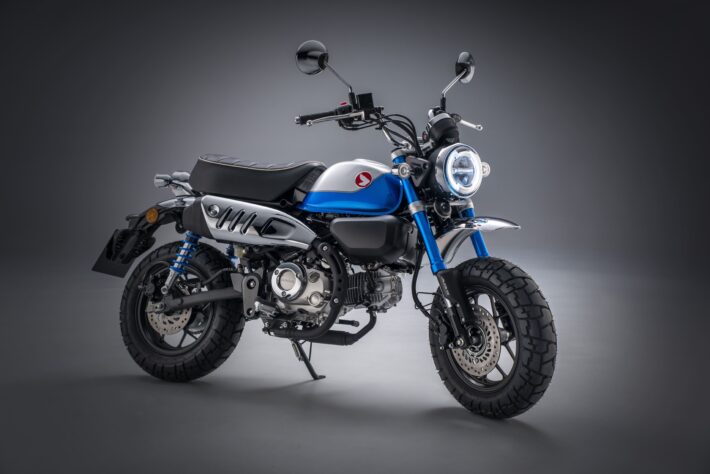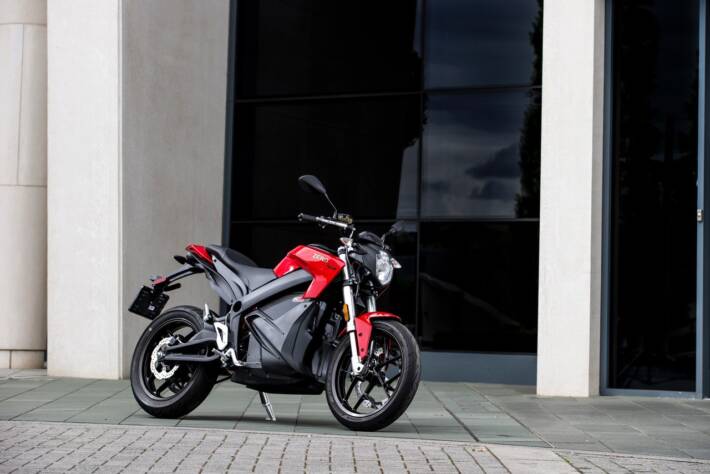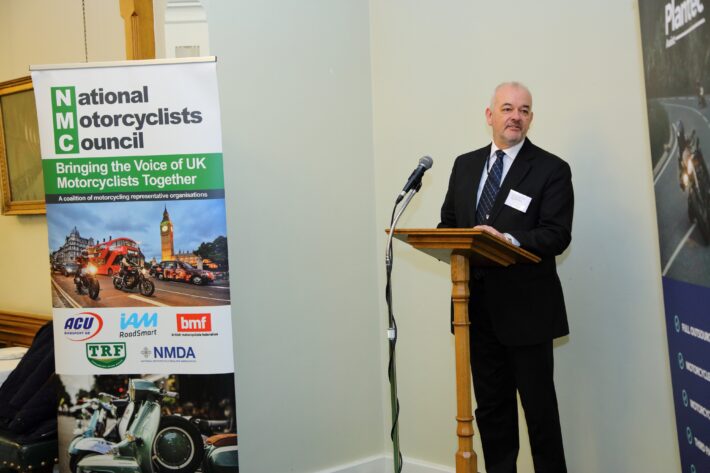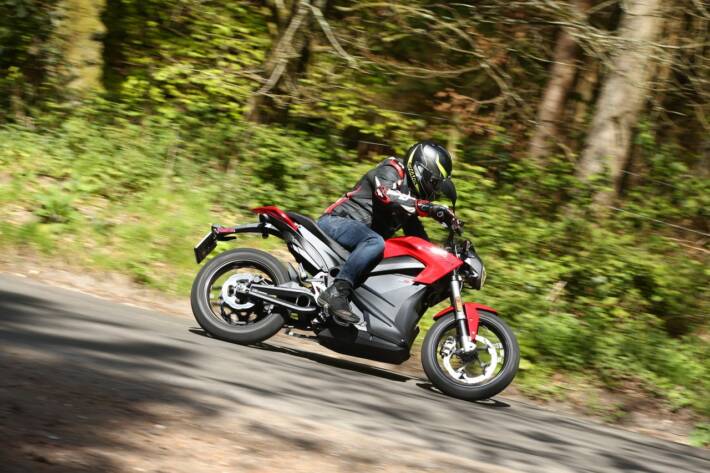Government consulting on plans for the early death of new petrol bikes
If you thought you could just ignore electric motorcycles, then there was a giant wake-up call from the UK government last month. Over the summer holidays, when most media attention was elsewhere, the Department of Transport began a consultation on ending petrol-powered new motorbike sales, and outlined its own proposals for change. You can read it here.
And they’re pretty stark: no new petrol motorbikes under 125cc allowed to be sold from 2030 – just over seven years from now. And *all* new petrol-powered motorcycles will be banned from 2035. That means around 12 years before your local dealer will only be allowed to have new electric bikes for sale.

The plans seem to be a simple copy and paste over from the plans for cars, where all internal combustion engines will be banned from 2030, with hybrid machinery permitted until 2035. But there’s little recognition of the fact that motorcycles are very different from a car. Large four-wheeled machines can quite easily accommodate a big, heavy, expensive battery pack as part of their design and pricing.
Fitting a power source weighing hundreds of kilos is fairly straightforward in a family car: there’s the petrol tank space, and plenty of room under the floor pan and around the boot area. The electric motors are generally much smaller than a large petrol engine too, allowing more room. If the car sells for £30-40k, then there’s room to absorb the battery cost too.
But motorbikes simply don’t have the same margins for space and mass, even allowing for no fuel tank and a smaller powertrain. You can manage easily enough with a very low-powered short-range urban machine, equivalent to a moped or small scooter, where the battery pack is small, light and cheap.
But the moment you try and match the power and range of even a fairly standard middleweight machine – say a Kawasaki Z900 or a Triumph Street Triple, the battery pack becomes very heavy, large and expensive. And certain machine types – supersport bikes, adventure bikes and full-dress tourers, say, are simply impossible to produce with the same – or even comparable – weight, range, power and cost figures.
Without a major step-change in battery technology, which is looking unlikely in the timescales required, the bike market is going to suffer greatly in terms of reduced machine choice and availability. The laws won’t affect used machines – you’ll still be able to buy and sell second-hand petrol-powered bikes – but as time goes on, that will become harder, as bikes wear out – and there will be zero innovation in bike design possible.

There are even worries about the widespread availability of petrol longer-term, as cars and vans all switch away from internal combustion engines. Even basics like engine oil and spark plugs could become niche items.
Perhaps unsurprisingly, the motorcycle industry and riders’ groups have responded with various degrees of disappointment and anger. The MCIA – the trade body for the bike industry in the UK – is normally quite restrained in its public statements. But it calls the plans disappointing, and calls for more time for the phase-out, as well as an end to the early ban on light 125cc machinery.
“The Motorcycle Industry Association (MCIA) has been fully supportive of the Government’s net zero ambitions, for example through the L-Category Action Plan,” said an MCIA press release. “However, we are disappointed with today’s announcement to phase out all new non-zero emission motorcycles by 2035.
“Making up just 0.5% of UK domestic transport emissions, this news is a missed opportunity to allow industry more time to adapt, and for technology to catch up. Our case to Government explained why this sector needs a different approach, in particular where our products are primarily used for sport and leisure activities.”
And the CEO of the MCIA, Tony Campbell, said: “We recognise our environmental contribution will increase as other transport modes phase out and so support the decision to phase out L1 [50cc] vehicles by 2030. However, we do not support the decision to include L3e-A1 [125cc bikes], which even with an ICE powertrain are significantly more environmentally efficient than some electric cars.
“The government has not considered the complexities of the sector in terms of what is and isn’t feasible when it comes to phasing out the other key segments of the market.”
The National Motorcyclists Council is a lobbying group which argues for riders’ rights at a high level in government. Again, it’s normally quite diplomatic in its communications, but also seems to be fuming about the proposals, and argues strongly that the government has not looked hard enough at the situation, or considered alternative proposals including hydrogen power and synthetic biofuel use.

The NMC’s executive director, Craig Carey-Clinch, said: “The government’s ambitions in this area are clearly running ahead of what may be reasonable to deliver. Successful transition in any field requires those affected to be content with changes proposed. In the case of zero emission motorcycles, particularly in the premium market segments, current product availability, price point, the current state of electric bike technology and rider acceptability, suggests that much more will need to happen before a reasonable target date for full zero emission new production can be established.
It is not yet known whether manufacturing can meet these proposed targets with a range of motorcycle types which will have broad market appeal among riders, given the wide diversity of rider requirements and activities across the sector.
“One of the knock-on effects of these concerns is scepticism among sections of the motorcycling public about the electrification of motorcycles. This is should not be brushed aside by the Government. Rider opinions must not be ignored in the rush to decarbonise.
“The NMC is also disappointed that the government sees alternative fuels as only a stepping stone to full electrification. This is not the technology neutrality the government claims to have. The move towards net zero is a matter which is too technologically detailed to restrict it to battery electrification only. Imposing specific technologies means limiting choice and therefore creating a constraint on innovation. Automotive manufacturers (and the aviation industry) are making significant investments in developing synthetic fuels which have the potential to allow ICE technology to continue while being part of the move towards decarbonisation. Other technologies such as hydrogen powered vehicles are also part of the development of new technologies.”

Finally, the Motorcycle Action Group is uncompromising in its opposition to the proposals. MAG Chair, Neil Liversidge, said: “MAG totally opposes the proposed ban on the sale of internal combustion-engine vehicles (ICEVs), whether it be from 2035, the originally mooted 2040, or any other date. MAG likewise opposes any policy that leads to increased fuel costs or the reduced availability of fuels for ICEVs.”
And Liversidge says he has the backing of MAG members – and opposes the ban on ICE-powered cars too. “Our own survey showed that at least 80% of motorcyclists oppose it, despite green activists having targeted our survey to skew the result. We estimate that the real proportion of motorcyclists who oppose the ban is well over 90%. We shall faithfully represent the views of our constituency. We also oppose the ban on the sale of ICE cars proposed from 2030 and stand resolutely with the Alliance of British Drivers (ABD).
“We note that the consultation asks from ‘when’ the ban should come about? Our answer is ‘Never!’ We demand a dialogue on whether it should come about at all.”
The Department of Transport consultation on the end of new petrol-powered motorcycles runs until September 21st. You can make your views known via this link.

10 comments on “Is this the early death of new petrol bikes?”
I completely disagree with the government to lump motorcycles with cars as the technology is not there now or in the foreseeable future for the electrification of medium and large motorcycles but I also wonder if petrol station sales drop significantly due to the electrification of cars they will either close or be very expensive and where would ice motorcyclist be able to get fuel
“If you thought you could just ignore electric motorcycles…”, hmm… Yes, I could just ignore “electric motorcycles” and I will always ignore “electric motorcycles”. To anybody thinking motorcycles are just a mode of transportation, it’s not. At least to me. Riding motorcycles is much more than that. I would rather ride a bicycle than “electric motorcycle”. And that term, “electric motorcycle”. What the heck is that? There is nothing like that in my dictionary. “Electric motorcycles” stink and make me sick. That’s it. Thank you!
It will be the end of motorcycling altogether as motorcyclists don’t want them this has been voiced so often on social media, but yhe manufacturers are not listening and the UK government don’t see them as essential.
It’s very hard to draw the line for any government,but the fact is the world is heating up faster than we anticipated, technology is very likely to move faster when given no ultimatum as history has shown us.So we have a future hopefully for our children if we want to care. I personally enjoy my motorcycle and the feeling of freedom it gives, am I worried this will stop or am I worried their will be no real future for my children,not really a difficult choice for me.
Typical politicians- got their heads up you know where. Do not really know what they are doing whichever group they belong to. Why can’t they get in the real world. Is it the way they were brought up? My feelings- exasperated again!
The government are blinkered into moving to fast to ban ALL petrol vehicles both motor cycles & cars without full consent & the views of the public & motor cyclists & are hell bent on introducing full vehicle electricification.
More time is needed to consider other associated fuel technologies & more thought given to the reduction & timescale for phasing out petrol vehicles, especially with regard to the use & continued beneficial use of motor cycles .
I’ve just been reading about an electric motorcycle that cost’s a staggering £27,000.
I’m sorry but I’ve not managed to spend that on the fifteen petrol motorcycles I’ve owned over the years. All of which have been so well Engineered that they’ll probably outlast me!!.
An electric bike is nothing more than a motor, battery & charging unit bolted to a pair of wheel’s, it doesn’t have a proper gearbox, crankshaft, camshaft or all the other various piece’s of precision engineered parts.
So why the astronomical costs?.
Yes the costs will obviously come down once electric bikes become common place but non the less the current manufacturer’s of these electric bikes need to make the whole buying experience more attractive & indeed financially accessible.
Sadly I guess the much loved motorbike will become exactly that a motor/bike. 🙁
When these type of proposals come out, many observers talk about the need to cut emissions. I AGREE, but hold on, the 4 billion plus people in India, China and SE Asia will keep their petrol powered vehicles. What happens in Europe is largely irrelevant, its what happens in Asia that matters when we’re talking about global emissions
I have been a motorcyclist since I was was legally allowed to ride and I also drive. i am in favour of electric vehicles from an environmental standpoint, but it cannot happen over night as some nuthobs think. People need to understand that the public cannot suddenly be forced to swap their old vehicles for new greener options that currently are financially out of their reach. Les
The eco-maniacs seem to have convinced politicians that all internal combustion transport is BAD. Simply transferring all motoring to electric ignores the fact that many sources of electricity will produce ever more pollution, as will mining of rare earth elements for batteries, not too mention the building of whole new vehicles rather than keeping older running models going.
Most road users can’t just scrap their current vehicles (ever) due to finances.
Imposing electric-only bans is a challenge to individual human rights insofar as it restricts the individual’s ability to roam and travel by a mode of your choice – be that foot, bike, car, bus or rail, etc.
Draconian or what?